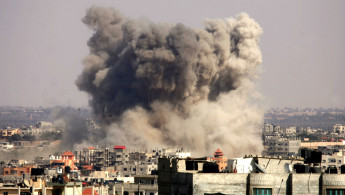Qana and Rafah: massacres pre-approved by Israel?
Last week, the Israeli columnist Yigal Sarna caused controversy by stating in an article that the 1996 Qana massacre was not a "mistake or error", as Israel claims, but a planned operation to save an Israeli unit headed by Naftali Bennett, now the country's economic minister.
According to his article, Bennett's unit was detected inside Lebanese territory and attacked by Hizballah fighters during the 1996 Israel-Hizballah conflict.
According to Israel's Channel 10 journalist Raviv Drucker, Bennett's "hysterical" calls for assistance led the army to shell the surrounding area, which included a UN peacekeeping base in the village of Qana, where thousands of Palestinian refugees had sought shelter.
More than 100 civilians were killed in that bombardment and, despite international condemnation, Israel escaped UN censure thanks to a US veto that thwarted a resolution.
Israel expressed regret but did not apologise for Qana, the massacre was added to the list of Israeli outrages, and no one focused on the reasons that led to the outrage.
However, the issue re-entered public attention last week after Bennett defended the Israeli army's shelling of Rafah after the capture of an Israeli officer during the Gaza war of 2014. More than 130 Palestinians were killed in that action.
| Israel expressed regret but did not apologise for Qana, the massacre was added to the list of Israeli outrages, and no one focused on the reasons that led to the outrage. |
Bennett said the unit involved, the Givati Brigade, should be awarded medals rather than face investigation. The Israeli press then reported that Givati's commander, Colonel Ofer Vinter was also involved in the attack on Qana in 1996.
Further, during the Israeli military's investigation in the aftermath of Qana, Bennett confirmed that Vinter was in the area and had taken part in battles surrounding Qana.
Both massacres share in common the possibility that Israel had used what is known as the "Hannibal directive" - which allows the use of any means necessary, including indiscriminate shelling, to prevent Israeli soldiers from being captured - even if it leads to their and other people's deaths.
The directive was drafted in 1986 by a committee of officers and remained secret until the Rafah massacre in August 2014, when it was revealed as part of efforts to protect the Givati Brigade from being prosecuted.
The Israeli army's leadership said the bombardment of Rafah was an implementation of the special directive to prevent or foil the capture of Israeli soldiers.
Bennett's links to Givati and its commander, therefore, raise the question of whether the Qana massacre was the result of the use of the directive to prevent his capture. That suggests a premeditated act - rather than the mistake in the heat of battle that Israel claims it to have been.
This is an edited translation from the original Arabic.





 Follow the Middle East's top stories in English at The New Arab on Google News
Follow the Middle East's top stories in English at The New Arab on Google News


